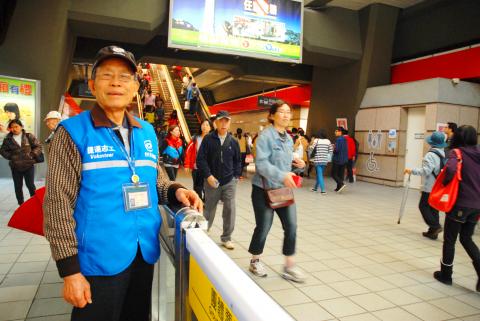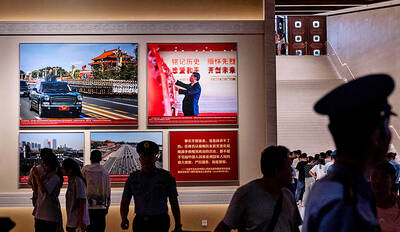Leaving through exit No. 1 of Taipei’s Jiantan MRT Station on a busy weekend, one could be forgiven for being impressed not by the throng of people, but by the energetic movements of a silver-haired volunteer standing at the gate, helping tourists with directions and providing introductions to local attractions.
Eighty-three-year-old Chang Jui-fa (張瑞發) — a former Taiwan Railway Administration (TRA) employee with 42 years of service on retirement — attracted the attention of the media on March 28, when Taipei’s metro rail system welcomed its 5.6 billionth passenger and invited some of its most senior volunteers to participate in festivities to celebrate the milestone.
Most were unaware that Chang was the most senior volunteer until he was introduced at the event, and his experience led to questions on what motivated him to be a volunteer worker for so many years.

Photo: Wu Liang-yi, Taipei Times
Chang’s answer was simple: “If you want to live as a part of society, then you should do everything you can for it.”
Chang said he retired in 1996 after working for the TRA for more than four decades, and though he initially found retirement to be very relaxing, he soon became bored.
In late 1997, the MRT’s Tamsui line had just started trial operations and the system was flooded with people, leaving the company desperate for more hands.
On hearing of the need for volunteers, Chang said he immediately signed up and has regularly reported for duty at Jiantan Station ever since. Chang, a Shilin (士林) resident, starts work at 4pm on weekends and on Mondays, and over the past 15 years has logged more than 5,500 hours of service.
“I wanted to serve people and society, and provide a convenient service whether they were traveling for work or pleasure,” Chang said, adding that it was this philosophy that imbued his volunteer work with personal significance.
As as result Chang avoids arriving late, never goes home early, and has not missed any of the classes or certification courses that the company arranged for volunteers.
As Jiantan Station is near the entrance to the Shilin Night Market, the Grand Hotel and other tourist hotspots, it is one of the most visited stations in the capital, with many visitors needing information or help finding their bearings.
Chang said he stands by the MRT gates ready to answer any questions that travelers may have.
“However, the question most often asked is whether we can let people use the station’s restrooms,” Chang said, adding that as nearby Shilin Night Market might not have such facilities he was always willing to be accommodating.
Chang added that his work has some downsides, and that he finds some young people to be disrespectful and poorly mannered.
As an example he cited an incident where he had allowed a student to enter the station without paying in order to use the restroom. When the student came out from the restroom and was about to leave the station, he did not bother to thank Chang.
The student was surprised when Chang stopped him and asked politely whether he had something to say to him. Chang said that even after he asked the young man: “Shouldn’t you say thank you?” the student still did not seem to understand what he meant and just walked away.
In addition, Chang said that some travelers are unfamiliar with how to use the MRT’s coin-shaped tokens that are used for single trips, or by those without Easy Cards, adding that he once saw an MRT user who became so frustrated that they threw their token on the ground in rage.
Chang said he went over and taught the person how to exit the station using the token, but the traveler could not swallow their pride and merely said: “Why is the thing so difficult to use?” before leaving.
Chang said that after several years he has grown used to such behavior and usually does not mind it, adding that he focuses instead on the thanks he receives from people he has helped.
Furthermore, Chang’s proficiency in Japanese — a result of his childhood Japanese education — helps him interact with Japanese tourists.
Chang said there was once a Japanese tourist who had seemingly lost his wallet and had asked for help at the desk, but despite calling the police, no progress could be made because no one present understood Japanese.
Chang was called over and on questioning the man, he ascertained the tourist was unsure of whether he had brought his wallet with him when he left his hotel. On calling the hotel he found out that the man had indeed left it in his room.
The tourist was very surprised, and said he was very impressed with MRT personnel, Chang said.
In his decade-and-a-half as a volunteer, Chang said he has realized that as a volunteer it is necessary to have empathy and patience.
“You have to be able to step into someone’s shoes and think like them. Think what you would do if you were in their position,” Chang said.
Chang said he intends to continue as an MRT volunteer until he can no longer stand, adding that he is happy to be able to contribute to society in any way he can.

Three batches of banana sauce imported from the Philippines were intercepted at the border after they were found to contain the banned industrial dye Orange G, the Food and Drug Administration (FDA) said yesterday. From today through Sept. 2 next year, all seasoning sauces from the Philippines are to be subject to the FDA’s strictest border inspection, meaning 100 percent testing for illegal dyes before entry is allowed, it said in a statement. Orange G is an industrial coloring agent that is not permitted for food use in Taiwan or internationally, said Cheng Wei-chih (鄭維智), head of the FDA’s Northern Center for

The Chinese military has built landing bridge ships designed to expand its amphibious options for a potential assault on Taiwan, but their combat effectiveness is limited due to their high vulnerability, a defense expert said in an analysis published on Monday. Shen Ming-shih (沈明室), a research fellow at the Institute for National Defense and Security Research, said that the deployment of such vessels as part of the Chinese People’s Liberation Army (PLA) Navy’s East Sea Fleet signals a strong focus on Taiwan. However, the ships are highly vulnerable to precision strikes, which means they could be destroyed before they achieve their intended

About 4.2 million tourist arrivals were recorded in the first half of this year, a 10 percent increase from the same period last year, the Tourism Administration said yesterday. The growth continues to be consistent, with the fourth quarter of this year expected to be the peak in Taiwan, the agency said, adding that it plans to promote Taiwan overseas via partnerships and major events. From January to June, 9.14 million international departures were recorded from Taiwan, an 11 percent increase from the same period last year, with 3.3 million headed for Japan, 1.52 million for China and 832,962 to South Korea,

REWRITING HISTORY: China has been advocating a ‘correct’ interpretation of the victory over Japan that brings the CCP’s contributions to the forefront, an expert said An elderly Chinese war veteran’s shin still bears the mark of a bullet wound he sustained when fighting the Japanese as a teenager, a year before the end of World War II. Eighty years on, Li Jinshui’s scar remains as testimony to the bravery of Chinese troops in a conflict that killed millions of their people. However, the story behind China’s overthrow of the brutal Japanese occupation is deeply contested. Historians broadly agree that credit for victory lies primarily with the Chinese Nationalist Party (KMT)-led Republic of China (ROC) Army. Its leader, Chiang Kai-shek (蔣介石), fled to Taiwan in 1949 after losing a